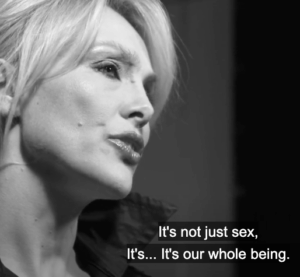There’s a strange thing that sometimes happens when we move to a new country. At first, it’s exciting. A fresh start! A new culture! Different cheese! But quietly, without fanfare, we begin adjusting, adapting – and little by little, performing. Not out of malice or manipulation, but out of a deep wish to be accepted. To belong. And in the process, we may stop seeing ourselves altogether. What starts as practical adjusting to new culture can sometimes lead to a subtle immigrant identity crisis.
The Invisible Job of Being “Likeable”
For many of us, especially in the early days of immigration, there’s an unspoken pressure to fit in. We notice how people talk, what they wear, when they laugh, how often they say “sorry,” and then – subtly, strategically – we start copying it.
We want to be the friendly one. The easygoing one. The one who gets invited, not side-eyed.
So we smooth over our accents. Downplay our differences. Say “yes” when we want to say “maybe not.” We become professional adapters. Cultural chameleons. This is classic people pleasing, and while it might help us feel liked in the short term, it can chip away at our deeper sense of self.
And while this might help us be accepted on the outside, inside it can feel… hollow. Because somewhere along the way, we stop asking ourselves: But what do I actually want?
Identity on Mute
When we spend too long trying to blend in, our own identity starts to go quiet.
Not in a dramatic, midlife-crisis way. More like a slow fade. One day you realise you’re not sure what kind of music you actually like anymore – or whether you’re going to that dinner because you want to, or just because it seems like the “normal” thing to do.
It can feel like living in someone else’s clothes. They mostly fit, they’re socially acceptable – but something’s off.
You don’t feel fully at home in the city, but you also don’t feel quite at home in yourself. That’s when expat identity crisis can quietly sneak in.
“If I Belong, Then Who Am I?”
The paradox of belonging is this: if we’re only liked because we’re agreeable, do we really feel seen?
People-pleasing can be especially sneaky during immigration because it often starts as survival: we genuinely need connection, support, guidance. But if we keep going on autopilot, we start mistaking being accepted for being ourselves.
It’s not that blending in is wrong. It’s that blending in should never require fading out.
5 Signs We’re Losing Ourselves (Without Realising It)
If any of these sound familiar, you might be caught in the “perform-to-belong” loop:
- You often say yes when you mean maybe, or no.
- You feel socially tired, even after “pleasant” conversations.
- You constantly compare yourself to locals or others who seem to have it more “together.”
- You worry you’ll be rejected if you show more of your actual self.
- You can’t quite define what feels off – just that something’s not “you” anymore.
This is one of the less visible but deeply felt aspects of the emotional impact of relocation.
And no, it doesn’t mean you’re doing it all wrong. It means something in you is whispering: Come back.
Being Seen Without Performing
So how do we reconnect with ourselves in a place where everything feels unfamiliar?
It starts with curiosity.
What do we actually like? What foods? What pace of life? What kind of conversations feel nourishing – not just polite? What boundaries feel honest, even if they disappoint someone?
Rebuilding this connection isn’t about rejecting our new culture. It’s about remembering that belonging after immigration is real only when we show up as who we are—not who we think they want.
This takes time. Gentleness. Sometimes, professional help.
Sometimes we feel lost in a new place not because the place is wrong—but because we haven’t yet given ourselves permission to bring our full selves into it.
If you feel like you’re performing more than living… adapting more than expressing… maybe it’s time to pause.
To gently ask: Where did I go, in the process of trying to belong?
And if you’d like a company in exploring that question—someone who’s walked this path and isn’t there to judge or fix, but to help you see yourself again—I’m here, contact me.





